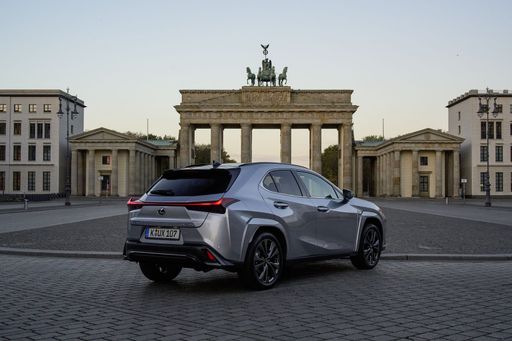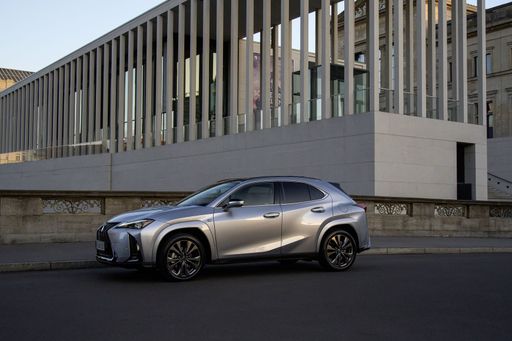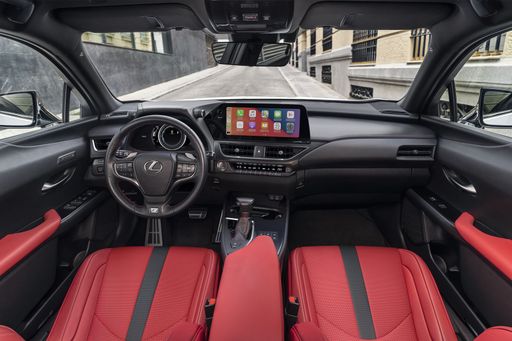Lexus UX vs Toyota C-HR - Differences and prices compared
Compare performance (199 HP vs 223 HP), boot space and price (37900 £ vs 29100 £ ) at a glance. Find out which car is the better choice for you – Lexus UX or Toyota C-HR?
Costs and Efficiency:
Price and efficiency are often the first things buyers look at. Here it becomes clear which model has the long-term edge – whether at the pump, the plug, or in purchase price.
Toyota C-HR has a distinct advantage in terms of price – it starts at 29100 £ , while the Lexus UX costs 37900 £ . That’s a price difference of around 8794 £.
Fuel consumption also shows a difference: Toyota C-HR manages with 0.80 L and is therefore decisively more efficient than the Lexus UX with 5 L. The difference is about 4.20 L per 100 km.
Engine and Performance:
Power, torque and acceleration are the classic benchmarks for car enthusiasts – and here, some clear differences start to show.
When it comes to engine power, the Toyota C-HR has a slightly edge – offering 223 HP compared to 199 HP. That’s roughly 24 HP more horsepower.
In acceleration from 0 to 100 km/h, the Toyota C-HR is hardly perceptible quicker – completing the sprint in 7.40 s, while the Lexus UX takes 7.90 s. That’s about 0.50 s faster.
In terms of top speed, the Toyota C-HR performs minimal better – reaching 180 km/h, while the Lexus UX tops out at 177 km/h. The difference is around 3 km/h.
Space and Everyday Use:
Cabin size, boot volume and payload all play a role in everyday practicality. Here, comfort and flexibility make the difference.
Both vehicles offer seating for 5 people.
In curb weight, Lexus UX is minimal lighter – 1495 kg compared to 1505 kg. The difference is around 10 kg.
In terms of boot space, the Toyota C-HR offers noticeable more room – 447 L compared to 320 L. That’s a difference of about 127 L.
In maximum load capacity, the Lexus UX performs hardly perceptible better – up to 1231 L, which is about 76 L more than the Toyota C-HR.
When it comes to payload, Lexus UX distinct takes the win – 615 kg compared to 425 kg. That’s a difference of about 190 kg.
Who wins the race?
The Toyota C-HR proves to be leaves the rival little chance and therefore becomes our DriveDuel Champion!
Toyota C-HR is the better all-rounder in this comparison.

Toyota C-HR
Costs and Consumption
View detailed analysis
Engine and Performance
View detailed analysis
Dimensions and Body
View detailed analysis
Lexus UX
The Lexus UX is a compact luxury crossover that blends sharp styling with a quiet, comfortable cabin, perfect for urban buyers who want premium feel without shouting about it. It rides with poise, serves up plush materials and thoughtful tech, and—while it won’t satisfy anyone chasing track thrills—it's a smart, stylish choice for everyday driving.
details



Toyota C-HR
The Toyota C-HR cuts a striking figure with its angular styling and coupe-like profile, so you’ll never go unnoticed in the supermarket car park. It balances everyday practicality with a nimble, city-friendly personality, making routine commutes feel a touch more fun without asking for forgiveness.
details




Costs and Consumption |
|
|---|---|
|
Price
37900 - 54100 £
|
Price
29100 - 42800 £
|
|
Consumption L/100km
5 - 5.6 L
|
Consumption L/100km
0.8 - 5.1 L
|
|
Consumption kWh/100km
-
|
Consumption kWh/100km
-
|
|
Electric Range
-
|
Electric Range
68 km
|
|
Battery Capacity
-
|
Battery Capacity
-
|
|
co2
113 - 127 g/km
|
co2
17 - 115 g/km
|
|
Fuel tank capacity
43 L
|
Fuel tank capacity
43 L
|
Dimensions and Body |
|
|---|---|
|
Body Type
SUV
|
Body Type
SUV
|
|
Seats
5
|
Seats
5
|
|
Doors
5
|
Doors
5
|
|
Curb weight
1495 - 1555 kg
|
Curb weight
1505 - 1755 kg
|
|
Trunk capacity
283 - 320 L
|
Trunk capacity
350 - 447 L
|
|
Length
4495 mm
|
Length
4362 mm
|
|
Width
1840 mm
|
Width
1832 mm
|
|
Height
1540 mm
|
Height
1558 - 1564 mm
|
|
Max trunk capacity
1194 - 1231 L
|
Max trunk capacity
1076 - 1155 L
|
|
Payload
555 - 615 kg
|
Payload
375 - 425 kg
|
Engine and Performance |
|
|---|---|
|
Engine Type
Full Hybrid
|
Engine Type
Full Hybrid, Plugin Hybrid
|
|
Transmission
Automatic
|
Transmission
Automatic
|
|
Transmission Detail
CVT
|
Transmission Detail
CVT
|
|
Drive Type
Front-Wheel Drive, All-Wheel Drive
|
Drive Type
Front-Wheel Drive, All-Wheel Drive
|
|
Power HP
199 HP
|
Power HP
140 - 223 HP
|
|
Acceleration 0-100km/h
7.9 - 8.1 s
|
Acceleration 0-100km/h
7.4 - 9.9 s
|
|
Max Speed
177 km/h
|
Max Speed
175 - 180 km/h
|
|
Torque
-
|
Torque
-
|
|
Number of Cylinders
4
|
Number of Cylinders
4
|
|
Power kW
146 kW
|
Power kW
103 - 164 kW
|
|
Engine capacity
1987 cm3
|
Engine capacity
1798 - 1987 cm3
|
General |
|
|---|---|
|
Model Year
2025
|
Model Year
2024 - 2025
|
|
CO2 Efficiency Class
C, D
|
CO2 Efficiency Class
C, B
|
|
Brand
Lexus
|
Brand
Toyota
|
Is the Lexus UX offered with different drivetrains?
Available configurations include Front-Wheel Drive or All-Wheel Drive.




